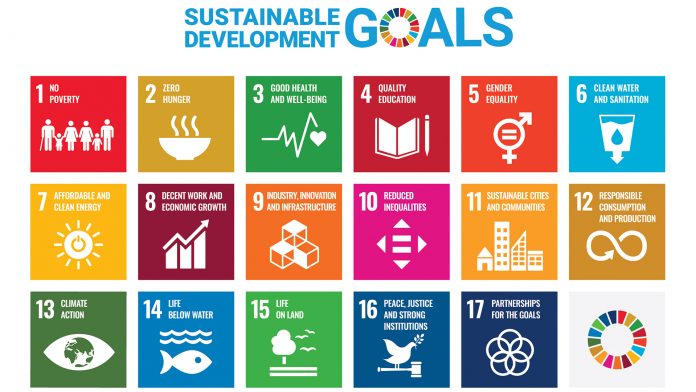Dr Guy Schumann, CEO and Principal Scientist at RSS-Hydro Sarl-S, argues that more businesses need to include the UN’s Sustainable Development Goals in their mission and activities.
The Sustainable Development Goals (SDGs) were adopted by all Member States of the United Nations (UN) in 2015 as a universal call to action to end poverty, protect the planet, and ensure that all people enjoy peace and prosperity by 2030. This sounds overambitious, of course, but the SDGs provide a blueprint to achieve a better and more sustainable future for all. The goals are supposed to address the global challenges of our times, including poverty, inequality, climate change, environmental degradation, conflicts, and injustice.
Many of these global challenges are further exacerbated by natural and man-made disasters such as droughts and floods. Droughts and floods are the two extreme ends of the hydrological cycle, where one is too little water and the other is too much. Droughts occur when an abnormally long dry period uses up available water resources, whereas floods occur when watercourses or rain swallow up land that is usually uncovered. These two types of natural disasters are often made worse by human action and increasingly so by climate change, and they are therefore intrinsically creating many challenges, most of which the Sustainable Development Goals set out to address.
Increased disaster frequency
In Europe, as well as in the rest of the world, water-related disaster events have increased in terms of frequency and overall impact in recent years, causing a considerable loss of life and damage to ecosystem services and national economies. According to the International Disaster Database, EMDAT,1 the number of recorded natural disaster events, such as droughts, floods, storms, heatwaves, landslides, wildfires, earthquakes etc., have increased sixfold in the last 25 years, with a further increases predicted. This increase is intricately linked to urban development, an incessant population growth and climate change.
South Sudan
The recent drought and flood disasters in South Sudan are a good example of the devastation and challenges we see increasing in numbers at global level. According to the United Nations, more than 600,000 people have been displaced by flooding in South Sudan since July 2020, exacerbating the already critical situation related to COVID-19. South Sudan has a long history of high-impact natural and manmade disasters like droughts, flooding, desertification, internal conflicts, and wars.
Connected extreme events, such as floods following droughts, and compound events like droughts or floods coinciding with the global coronavirus pandemic, are becoming more frequent, creating unprecedented challenges that we are clearly not prepared for or able to manage. We are currently fighting a global pandemic, which puts an even bigger strain on humanitarian response and available resources. Typical donor nations are now spending large amounts of money in their own fight against COVID-19, thereby significantly reducing the budgets of aid packages.
Climate change
The impacts of extreme events like those in South Sudan will be amplified by the climate emergency, which is already affecting many regions of the world, causing the activation of so-called negative feedbacks in which we all play a significant role. Therefore, climate change should be acted upon quickly; within that context, implementing the Sustainable Development Goals is certainly a significant step in the right direction. This of course requires actions through collaborations such as public-private partnerships (PPPs).
However, according to a study by PwC2 that looked at if and how private sector companies use SDGs in their business, out of more than 1,000 companies, 72% mentioned SDGs in their reporting but only 14% included specific SDG targets. Aligning activities closely with the SDGs will allow businesses to understand and better tackle global risks. PwC further reports that the next 10 years will be crucial for action and the companies that show a strong leadership on the SDGs will be most likely to win the support of stakeholders, investors, consumers, and society in general.
RSS-Hydro
Like some other companies, RSS-Hydro has included the Sustainable Development Goals in its mission and business activities, with the aim of developing sustainable service solutions for society and the Earth’s ecosystem under a changing climate and for responding sustainably to extreme events. Of the 17 SDGs, RSS-Hydro has identified six which are most closely aligned with its activities:
- SDG 1: no poverty – to reduce exposure and vulnerability to climate-related extreme events;
- SDG 2: zero hunger – to promote sustainable agriculture and strengthen the capacity for adaptation to events, such as floods and droughts;
- SDG 6: clean water and sanitation – for a more sustainable management of water;
- SDG 13: climate action – to combat climate change and its impacts;
- SDG 15: life on land – calling for sustainable use of terrestrial and inland freshwater ecosystems; and
- SDG 17: partnership for the goal – this highlights that SDGs can only be realised with strong global partnerships, co-operation, and the sharing of innovative ideas.
The current momentum of both public and private sector entities in engaging with the SDGs is clearly an excellent start. However, more companies, NGOs, and government agencies clearly need to join the collective effort and more needs to be done to be able to respond to the challenges of the SDGs responsibly and most effectively.
References
- EMDAT (2020): OFDA/CRED International Disaster Database, Université catholique de Louvain, Brussels, Belgium – http://www.emdat.be
- PwC. ‘Creating a strategy for a better world How the Sustainable Development Goals can provide the framework for business to deliver progress on our global challenges’, 2019 – www.pwc.com/gx/en/sustainability/SDG/sdg-2019.pdf
Dr Guy Schumann
CEO and Principal Scientist
RSS-Hydro Sarl-S
+352 206005 6301
info@rss-hydro.lu
www.linkedin.com/company/rss-hydro/about
www.rss-hydro.lu





